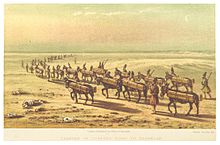caravan

Caravans ( Persian کاروان; Karvan ) are large travel companies, especially in the centuries-powered caravan routes to the 20th century front and Central Asia and North Africa were traveling. Such societies could sometimes consist of 1,000 or more camels , mules or donkeys . The caravanserais or ksour (Tunisia) served the caravans as a sheltered camp and / or as a hostel.
Trade caravans
Merchants, who often bartered , joined together in trade caravans . Their leader was called Karwan-Bashi . Some of the most important routes for trade caravans were the Silk Road from East Asia to the Mediterranean or the Frankincense Route from southern Arabia to the Mediterranean. The salt caravans of Ethiopia emanating from the Afar Depression should also be mentioned in this context. To this day, salt caravans have been preserved from the Bilma and Fachi oases in Niger and from the Taoudenni salt mine to Timbuktu in Mali .
Pilgrim caravans
Caravans of pilgrims served as protection for the faithful on the pilgrimage ( Hajj ) to the holy places (e.g. Mecca , Medina , Karbala ), they were led by an Amir al-Hajj . The most famous pilgrim caravans of the Middle Ages and early modern times moved from Cairo and Damascus to Mecca.
America
The silver transports of the Spanish from the 16th to 19th centuries in Mexico or Bolivia were carried out by means of mule and donkey caravans; fortified caravanserais were also built for this in some places (see Camino Real de Tierra Adentro or Ojuelos de Jalisco ).
See also
Web links
- Thomas Staubli: Caravan. In: Michaela Bauks, Klaus Koenen, Stefan Alkier (Eds.): The Scientific Biblical Lexicon on the Internet (WiBiLex), Stuttgart 2006 ff.
